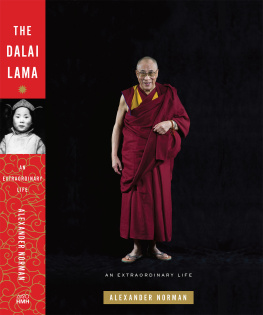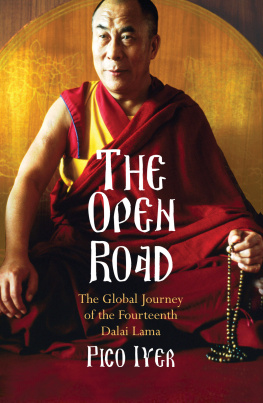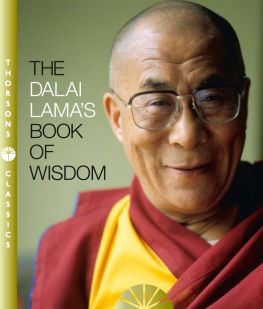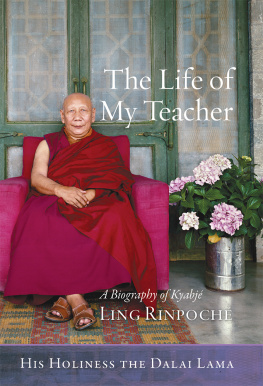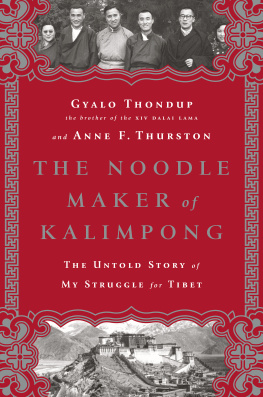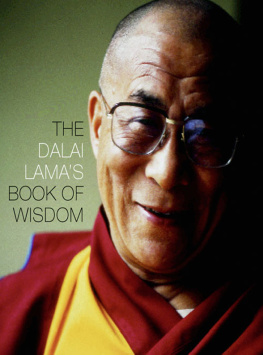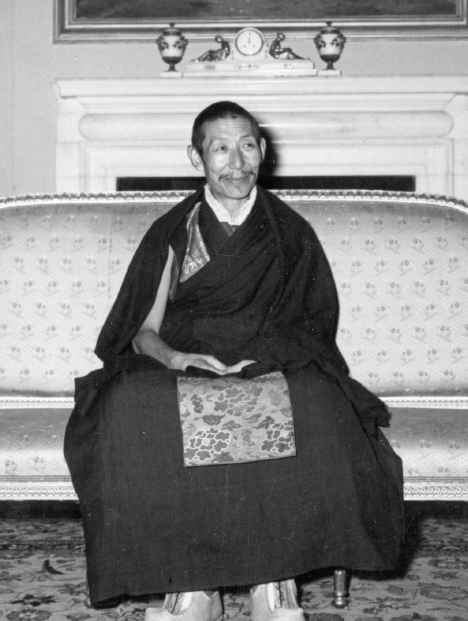
Kyabj Trijang Rinpoch at Hyderabad House, New Delhi, 1956
COURTESY OF PALDEN TSERING

Rinpoches interests were varied and his field of mastery wide, ranging from classical philosophy to literature and poetry, and from traditional Tibetan healing sciences to the visual arts. The collection of his writings reflects his broad command of Tibetan cultural traditions.... I feel fortunate to have been among the students of this great Tibetan master. I am profoundly grateful to Rinpoche for his kindness, for his teaching and transmissions, and for his personal friendship. It is a joy for me to add these few words of appreciation to the English translation of Trijang Rinpoches autobiography.
FROM THE FOREWORD BY
H IS H OLINESS THE D ALAI L AMA
Publishers Acknowledgment
The publisher gratefully acknowledges the generous help of the Hershey Family Foundation in sponsoring the production of this book.
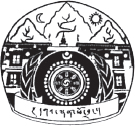
Foreword
BY HIS HOLINESS THE DALAI LAMA
I AM PLEASED that the autobiography of my late tutor, Kyabj Trijang Rinpoch, is being made available in English. Rinpoch was celebrated for his erudition and eloquence, and his autobiography stands as a testimony to his remarkable skills as a writer and keen observer of human experience.
Born in 1901, in Gungthang near Lhasa, Trijang Rinpoch was recognized as the reincarnation of his predecessor when he was barely three years old. He studied at the Sharts College of Ganden Monastic University, the seat of the great scholar and accomplished practitioner Tsongkhapa, and obtained his gesh lharam degree before reaching the age of twenty. He then joined Gyto Tantric College, where he completed his formal education. Rinpochs interests were varied and his eld of mastery wide, ranging from classical philosophy to literature and poetry, and from traditional Tibetan healing sciences to the visual arts. The collection of his writings reects his broad command of Tibetan cultural traditions.
In 1940 Trijang Rinpoch was appointed one of my debating assistants (tsenshab), and in 1952 he became my junior tutor; my senior tutor was Ling Rinpoch. I have fond memories of Rinpochs kindness throughout my childhood.
Since his predecessors had close ties to the practice, as did his root lama Phabongkha Rinpoch, it is understandable that my late tutor followed them in propitiating Dlgyal (Dorj Shukden). Nevertheless, the Great Fifth Dalai Lama was unequivocal in describing Dlgyal as an oath-breaking spirit born from perverse prayers... harming the teachings and all living beings. Therefore I was deeply grateful to Rinpoch for his steadfast support when I began to express my strong objections to Dlgyal practice. He once remarked to me that the investigative procedures I had followed with regard to this issue, including my consultations with the Nechung oracle, had been consistently reliable at critical junctures for Tibet and had stood the test of time.
Trijang Rinpoch died in November 1981. The moment I received news of his imminent demise, I rushed to his residence in Gangchen Kyishong. When I arrived, sadly Rinpoch had already passed away, but I was able to pay my respects. Soon after, at the request of Rinpochs personal staff, Ganden Sharts Monastery, and Rinpochs many devotees, I composed a prayer for the swift return of his reincarnation.
I feel fortunate to have been among the students of this great Tibetan master. I am profoundly grateful to Rinpoch for his kindness, for his teaching and transmissions, and for his personal friendship. It is a joy for me to add these few words of appreciation to the English translation of Trijang Rinpochs autobiography.

10 April 2018
Preface
K YABJ TRIJANG RINPOCH had been our family guru since long before I was born. My family sought his guidance and his divination for every major event in our lives, and the advice he gave us never failed to be beneficial. Even after 1959 Rinpoch always made me feel welcome and valued throughout the different phases of my life in exile. It was an incomprehensible loss when in 1981 Rinpoch passed away, like the sudden closure of a monumental library. I am honored to have this opportunity to share the life story of this incomparable lama with readers of the English language. Although I can scarcely hope to reproduce the beauty and free-flowing style of his writing, which in the original Tibetan is marked by elegance and candor, I hope this volume will provide even a little understanding of the immeasurable depth of his knowledge and compassion. My earnest wish is that this autobiography will reopen a small part of that huge library.
Kyabj Trijang Rinpoch wrote The Magical Play of Illusion in 1975. The full Tibetan title is Dga ldan khri chen byang chub chos phel gyi skye gral du rlom pai gyi na pa zhig gis rang gi ngang tshul ma bcos pa lhug par bkod pa khrul snang sgyu mai zlos gar, and it appears in volume 4 of Rinpochs collected works as published in New Delhi by Mongolian Lama Gurudeva. Shortly after its publication, I sought Kyabj Rinpochs blessing and consent to translate it into English, but because of major changes in my life, I had to delay work on the translation. After I moved to New York City in 1976, my good friends Benjamin and Deborah Alterman provided much-needed encouragement to continue the work on the translation. In 1981, through the kind support and recommendations of my good friend the late Kenneth Morgan, professor emeritus and former director of the Fund for the Study of the Great Religions of the World at Colgate University, and of John Carter, professor of philosophy and religion at Colgate and then director of the fund, I received a grant enabling me to travel to Tibet and to Dharamsala, India, where I completed the initial draft of the translation. I deeply appreciate their kindness.
The late Gyatso Tsering, former director of the Library of Tibetan Works and Archives and a devoted disciple of Kyabj Trijang Rinpoch, provided me with accommodation and office space while in Dharamsala and helped me obtain Indian visa extensions that enabled me to complete the initial draft of this translation. I received constant support from the late Kungo Palden Tsering, lifelong attendant of Kyabj Rinpoch, and from other staff members of Trijang Labrang. Joyce Murdoch, Elizabeth Grant, and Philippa Russell gave me invaluable suggestions. Ani Ursula Sollmann typed the original draft of the manuscript several times. My thanks to Zachary Larson for spending many hours with me in Madison preparing annotations. I deeply appreciate the valuable contributions of each of these people.
I offer my heartfelt thanks to my friend Jonathan Landaw, who rendered invaluable editorial assistance. I am very grateful to the late David Gonsalez (Losang Tsering) for his encouragement and support for this work. At my request David compiled the epilogue based on materials that I provided to him, including notes and letters from Kungo Palden Tsering and others. Sadly, David passed away in 2014 after prolonged illness. Thanks also to Andy Francis for his countless improvements to the style and clarity of the text and for his helpful annotations. Gavin Kilty lent instrumental support in interpreting difficult passages and in the rendering of verse and provided some of the glossary entries. Martin Brauen lent assistance in clarifying the identities and spellings of several European individuals mentioned in the text, and Joona Repo provided helpful information and editorial suggestions. Finally, I want to express my sincere appreciation to Daniel Aitken and Tim McNeill, publishers, and to my editor at Wisdom, David Kittelstrom, for his brilliant editorial work and sensitivity to the readers, which contributed immensely to the literary grace of this translation. I also want to thank everyone else at Wisdom Publications for their tireless work. Although I can never claim this to be a perfect translation, I am hopeful that with utmost devotion and genuine feeling for the work, I have at least not caused any damage to it.
Next page


